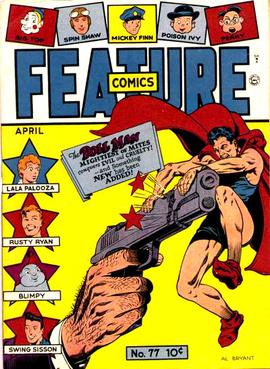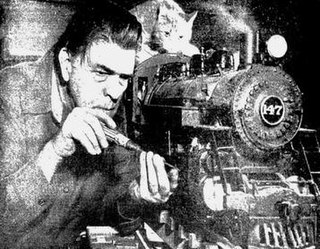Related Research Articles
United Feature Syndicate, Inc. (UFS) is a large American editorial column and comic strip newspaper syndication service based in the United States and established in 1919. Originally part of E. W. Scripps Company, it was part of United Media from 1978 to 2011, and is now a division of Andrews McMeel Syndication. United Features has syndicated many notable comic strips, including Peanuts, Garfield, Li'l Abner, Dilbert, Nancy, and Marmaduke.

The Newspaper Enterprise Association (NEA) is an editorial column and comic strip newspaper syndication service based in the United States and established in 1902. The oldest syndicate still in operation, the NEA was originally a secondary news service to the Scripps Howard News Service; it later evolved into a general syndicate best known for syndicating the comic strips Alley Oop, Our Boarding House, Freckles and His Friends, The Born Loser, Frank and Ernest, and Captain Easy / Wash Tubbs; in addition to an annual Christmas comic strip. Along with United Feature Syndicate, the NEA was part of United Media from 1978 to 2011, and is now a division of Andrews McMeel Syndication. The NEA once selected college All-America teams, and presented awards in professional football and professional basketball.

Frances Edwina Dumm was a writer-artist who drew the comic strip Cap Stubbs and Tippie for nearly five decades; she is also notable as America's first full-time female editorial cartoonist. She used her middle name for the signature on her comic strip, signed simply Edwina.

Feature Comics, originally Feature Funnies, was an American comic book anthology series published by Quality Comics from 1939 until 1950, that featured short stories in the humor genre and later the superhero genre.

Frank Merriwell is a fictional character appearing in a series of novels and short stories by Gilbert Patten, who wrote under the pseudonym Burt L. Standish. The character appeared in over 300 dime novels between 1896 and 1930, numerous radio dramas in 1934 and again from 1946 through 1949, a comic strip from 1928 through 1936, a comic book Frank Merriwell At Yale, and a 12-chapter serialized film in 1936. The book series was relaunched in 1965, but only three books were published.

Francis Godwin was an American illustrator and comic strip artist, notable for his strip Connie and his book illustrations for Treasure Island, Kidnapped, Robinson Crusoe, Robin Hood and King Arthur. He also was a prolific editorial and advertising illustrator.

The McNaught Syndicate was an American newspaper syndicate founded in 1922. It was established by Virgil Venice McNitt and Charles V. McAdam. Its best known contents were the columns by Will Rogers and O. O. McIntyre, the Dear Abby letters section and comic strips, including Joe Palooka and Heathcliff. It folded in September 1989.
Allan Holtz is an American comic strip historian who researches and writes about newspaper comics for his Stripper's Guide blog, launched in 2005. His research encompasses some 7,000 American comic strips and newspaper panels. In addition to his contributions to Hogan's Alley and other publications about vintage comic strips, he is the author of American Newspaper Comics: An Encyclopedic Reference Guide (2012). He is a resident of Tavares, Florida.
Frank M. Borth III was an American comic book artist.

McClure Newspaper Syndicate, the first American newspaper syndicate, introduced many American and British writers to the masses. Launched in 1884 by publisher Samuel S. McClure, it was the first successful company of its kind. It turned the marketing of comic strips, columns, book serials and other editorial matter into a large industry, and a century later, 300 syndicates were distributing 10,000 features with combined sales of $100 million a year.
The Bell Syndicate, launched in 1916 by editor-publisher John Neville Wheeler, was an American syndicate that distributed columns, fiction, feature articles and comic strips to newspapers for decades. It was located in New York City at 247 West 43rd Street and later at 229 West 43rd Street. It also reprinted comic strips in book form.
The Register and Tribune Syndicate was a syndication service based in Des Moines, Iowa, that operated from 1922 to 1986, when it was acquired by King Features to become the Cowles Syndicate affiliate. At its peak, the Register and Tribune Syndicate offered newspapers some 60 to 75 features, including editorial cartoonist Herblock, comic strips, and commentaries by David Horowitz, Stanley Karnow, and others.

Robert William Satterfield, also known as "Sat", was an American cartoonist known for his editorial cartoons; he also created the comic strips The Family Next Door, Oh Thunder, and The Bicker Family; as well as the daily panels Sat's Bear and Days We'll Never Forget, as well as Bizzy Bear.
Publishers Newspaper Syndicate was a syndication service based in Chicago that operated from 1925 to 1967, when it merged with the Hall Syndicate. Publishers syndicated such long-lived comic strips as Big Chief Wahoo/Steve Roper, Mary Worth, Kerry Drake, Rex Morgan, M.D., Judge Parker, and Apartment 3-G.
The Public Ledger Syndicate was a syndication company operated by the Philadelphia Public Ledger that was in business from 1915 to circa 1950. The Ledger Syndicate distributed comic strips, panels, and columns to the United States and the United Kingdom, Ireland, Canada, Sweden, New Zealand, and Australia. The syndicate also distributed material from the Curtis Publishing Company's other publications, including The Saturday Evening Post, Ladies' Home Journal, and The Country Gentleman.
The Frank Jay Markey Syndicate was a small print syndication service that distributed comic strips and columns from the mid-1930s to c. 1950. Although small in size, the syndicate distributed strips by a number of notable cartoonists, including Ed Wheelan, Rube Goldberg, Boody Rogers, and Frank Borth. The syndicate also provided material for the burgeoning comic book industry, for companies like Quality Comics and Columbia Comics.
Metropolitan Newspaper Service (MNS) was a syndication service based in New York City that operated from 1919 to 1932. At first the syndication service of Metropolitan Magazine, it soon became affiliated with the Bell Syndicate, and then was acquired and absorbed into United Feature Syndicate.

Muggs and Skeeter was an American gag-a-day daily comic strip by Wally Bishop which ran from 1927 to 1974. Originally titled Muggs McGinnis, it was syndicated by the Central Press Association and then King Features Syndicate.
Horace T. Elmo was an American comic strip cartoonist particularly active in the 1930s and 1940s; he also ran a comic strip syndication service whose main claim to fame was that it employed Jack Kirby in the late 1930s.
References
- 1 2 3 "Virgil V. M'Nitt Journalist Dies" (PDF). The New York Times. June 16, 1964.
- ↑ Mark S. Monmonier (1989). Maps With the News: The Development of American Journalistic Cartography. University of Chicago Press. p. 83. ISBN 0-226-53411-1.
- ↑ "Central Press Has 50th Birthday Party," Editor & Publisher (October 15 1960). Archived at Stripper's Guide. Accessed Dec. 2, 2018.
- ↑ William Jennings Bryan (September 23, 1912). "THE TAFT-ROOSEVELT FEUD: Commoner Analyzes The Situation In The Republican Party And Shows The Causes Which Brought It About". The Sun, Baltimore, Md. Archived from the original on November 7, 2012.
- ↑ William Jennings Bryan (October 7, 1912). "Bryan Says Both Taft and Roosevelt Cloud Tariff Issue". Chicago Daily Tribune. Archived from the original on November 7, 2012.
- ↑ Katherine Joslin (2004). Jane Addams: A Writer's Life. University of Illinois Press. p. 137. ISBN 0-252-02923-2.
- 1 2 Watson, Elmo Scott. "CHAPTER VIII: Recent Developments in Syndicate History 1921-1935," A History Of Newspaper Syndicates In The United States, 1865-1935 (Western Newspaper Union, 1936). Archived at Stripper's Guide.
- ↑ "Press Manager Surprised By Developments". The Evening Independent. January 16, 1925.
- 1 2 "Central Press Purchased by King; To Be Operated as Separate Unit: Staff and Features of Cleveland Organization to be Continued Intact — New York Plant Not Included In Purchase — Eichel Shifted to West as Editor," Editor & Publisher (Feb. 15, 1930). Archived at Stripper's Guide. Accessed Dec. 1, 2018.
- ↑ "Frank McLearn, of King Features" (PDF). The New York Times. May 25, 1969.
- 1 2 3 Holtz, Allan. "End of Chip Collins Adventures," Stripper's Guide (April 29, 2006).
- ↑ "Murray Rosenblatt" (PDF). The New York Times. June 10, 1961.
- ↑ Ron Goulart, "The 30s – Boomtime for SF Heroes". Starlog magazine, January 1981 (pp. 31–35).
- ↑ "Walter Johns". The Nevada Daily Mail. August 27, 2002.
- ↑ Robinson entry, Who's Who of American Comic Books, 1928–1999. Accessed Oct. 14, 2018.
- ↑ "The Figgers Family" Retrieved 2013-04-04.
- ↑ Stripper's Guide: A Frank Merriwell Bulletin!, May 30th, 2006.
- ↑ Swanson entry, Lambiek Comiclopedia. Accessed Oct. 14, 2018.
- ↑ Holtz, Allan. "Dell Publishing’s 'The Funnies' Part 2," Stripper's Guide (April 22, 2008).
- ↑ Jay, Alex. "Ink-Slinger Profiles by Alex Jay: The Cartoonists of Just Among Us Girls," Stripper's Guide (March 01, 2011).
- ↑ Ink-Slinger Profiles by Alex Jay: Lee Stanley, by Alex Jay, at Stripper's Guide; published April 15, 2014; retrieved August 17, 2015
- ↑ Jay, Alex. "Ink-Slinger Profiles by Alex Jay: Elmer Messner," Stripper's Guide (July 03, 2014).